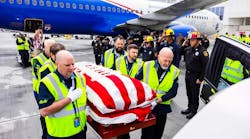Sept. 18--In the midst of Air Force concerns that Boeing risks a shortage of experienced mechanics to maintain the presidential Air Force One, Boeing plans to make a second round of offers to its Wichita hourly employees this week, Machinists union leaders said.
The offers will be for jobs at Boeing's San Antonio maintenance facility.
All Machinists-represented employees have been offered jobs in San Antonio, said the union's District 70 president Frank Molina. "Zero have been taken."
The union represents 384 Wichita workers.
Ensuring a qualified staff in San Antonio "is one of the most important aspects of the move yet least successful to date," the Air Force said in a letter to Boeing on July 30, according to a Bloomberg News report.
Boeing is transferring maintenance on the two 747 jumbo jets that transport the U.S. president and fly under the call sign Air Force One to its San Antonio facility as part of its plan to shut down the Wichita operations.
Boeing announced in January that it will close its Wichita facilities by the end of 2013. It said that because of cuts to defense spending, there was little hope to bring new work to the site.
Instead, Boeing plans to move engineering and program management work to Oklahoma City and maintenance work to San Antonio, where overhead costs are lower. Work that was to come to Wichita on the Air Force tanker program will now go to Seattle.
Boeing officials have said they expect employment in San Antonio to grow by about 400, some of that through job transfers.
To work on the presidential airplane, mechanics and other Air Force One specialists must have five years' experience on Air Force One or on comparable special mission airplanes, Air Force contracting officer Margaret Wright said in the letter to Boeing, Bloomberg reported.
"Boeing's relocation effort will challenge every aspect of the program," she wrote in the letter. Supporting Air Force One "requires nothing less than a seamless relocation effort."
Boeing spokesman Forrest Gossett said the company understands the requirements of all of its programs.
"We're committed to meeting those requirements for our customer," Gossett said.
He declined to discuss the details of the job offers or timing of the transition.
"We have contractual obligations that prevent us from discussion of our work on the nation's executive fleet," Gossett said.
The Air Force has asked Boeing to provide information so it could "better understand the experience environment currently residing at Boeing's maintenance facility in San Antonio," Air Force spokesman Daryl Mayer said in an e-mailed response to The Eagle.
It realizes Boeing is still in the transition planning stages, Mayer said.
"Since the Air Force measures success by executed results, it is premature to consider contractual remediation options," he said. "At this time, the USAF has no reason to believe Boeing won't meet all the terms and conditions of their respective contracts during this transition."
Servicing Air Force One is a "big deal," said the union's Molina.
"We have the staffing in Wichita," he said. "It took us a long time to get all those folks. It's not something you can do overnight."
The airplane is not a typical 747.
"It's got a lot of special equipment on it," Molina said. "You can't just have anybody around that airplane trying to work on it that really has no idea what they're doing."
The maintenance takes time and experience.
"They go through a lot to be serviced," Molina said.
The planes have been modified for midair refueling, which gives them unlimited range, feature electronics hardened against an electromagnetic pulse from a nuclear blast, communications gear that will let the president direct the armed forces while airborne and a medical suite that can function as an operating room.
An Air Force One is scheduled to come to Wichita in early 2013. The first Air Force One is reportedly scheduled to be in San Antonio in 2014.
Boeing's San Antonio workers don't have the specialized experience to work on Air Force One, Molina said. "They really need our Wichita crew in San Antonio to be able to efficiently and effectively work on that aircraft."
Machinists have declined jobs at the nonunionized San Antonio facility because they will lose benefits if they transfer, said Becky Ledbetter, Machinists District 70 assistant directing business representative.
Instead, taking jobs at Boeing facilities in the Pacific Northwest keeps their benefits intact because there they can work under the same union bargaining agreement, Ledbetter said.
That means they retain their pensions, early retirement medical benefits and accumulation of service time.
In San Antonio, their pensions would be frozen, Ledbetter said.
The Wichita workers are part of an older work force, and pensions and benefits are important, she said.
Another issue is the high security clearances needed to work on the presidential airplanes, Molina said.
The clearances, called Yankee White, take years and thousands of dollars to secure, he said.
"Those are hard to come by," Molina said. The employees' backgrounds and that of their families are highly scrutinized, he said.
"It's incredible to see what they have to go through," Molina said.
Some employees with the clearances have accepted transfers to Boeing's site in Everett, Wash., he said.
Boeing has made job offers to six or seven Wichita engineers for its San Antonio facility, said Bob Brewer, Midwest director of the Society of Professional Engineering Employees in Aerospace.
He's not aware of anyone who's accepted.
Boeing has made job offers to more than 300 engineers to move from Wichita to Oklahoma City.
The numbers fluctuate, but it appears that between 200 and 250 engineers will relocate there, Brewer said.
Some of those engineers work on Air Force One.
Brewer said he wouldn't be surprised if Boeing extends the time it takes to vacate the Wichita facilities beyond 2013.
For one, SPEEA's labor agreement between the Wichita engineering unit and Boeing has been extended until 2015.
"I don't think Boeing got nearly as many people to go to Oklahoma City as they first desired," Brewer said.
Relocation dates for the engineers keep shifting, he said.
No engineers have moved to date, he said. But in October, the first 25 to 50 engineers will be leaving Wichita.
He doesn't believe anyone thought the transition would go smoothly.
"There's going to be one huge disruption on every piece of the transition," Brewer said. "This is a huge, huge transition that we're going through."
Brewer said he doesn't understand moving the work.
"You've got the best right here in Wichita. We've got the people," he said. "We've got the facilities. We've got the capability. I don't know what else they want."
Copyright 2012 - The Wichita Eagle


